the history of yeovil's pubs
PUBS HOME PAGE |
PUBS INTRODUCTION |
PUBS BY NAME |
BEERHOUSES |
south western arms / inn
54 Middle Street
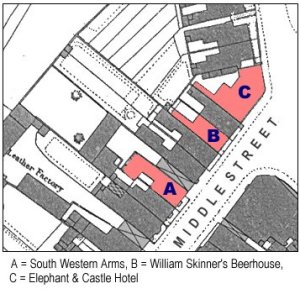 The
South Western
Arms (shown as
'A' on the map
at left) was
located in
Lower
Middle Street,
between
Central
Road and
Wyndham
Street, in the
building
occupied by the
Devil's Den of
Tattoos today
(clearly
recogniseable as
the same
building in the
photographs
below).
The
South Western
Arms (shown as
'A' on the map
at left) was
located in
Lower
Middle Street,
between
Central
Road and
Wyndham
Street, in the
building
occupied by the
Devil's Den of
Tattoos today
(clearly
recogniseable as
the same
building in the
photographs
below).
It
began life as a
beerhouse in the
wake of the
Beerhouse Act
1830 but the
earliest record
I could find was
a reference to
the South
Western Arms in
Kelly's
Directory of
1861 when I
suspect the
building was new.
In September 1862 George James Ridout applied to the Borough Petty Sessions for a new license which was refused at this time. However his application did outline the facilities of the premises ".... the house possessed every accommodation - stabling for fourteen or fifteen horses, a carriage entrance, and seven or eight bedrooms." It was also stated "He had had repeated applications for spirits, and not having a license, people went to other inns for refreshments and saddled their horses upon him."
In September 1867 William Skinner applied for an ale-house license which was objected to on a technicality by E Vincent, owner of the Elephant and Castle just a few doors away. What is interesting about the application is the report in the Western Gazette in which the accommodation of the South Western Inn is described ".... had all the requisites for an excellent ale-house. There was every accommodation for man and horse, including a spare sitting room, three spare bedrooms, club room, loose boxes and stalls, coach house, and a yard which could be locked up.... was admirably adapted for the accommodation of travellers. It was also much frequented by farmers and others." Nevertheless, at this time the application was refused.
An amusing snippet that caught my eye in the Western Gazette edition of 29 October 1886 reported "As a horse, with a load of manure behind it, was coming out of the yard of the South Western Inn on Wednesday afternoon, the horse swerved at the corner and the cart came into contact with the wall, with the result that the vehicle was smashed. The horse was thrown down and slightly injured, but the man who was driving it escaped uninjured." There was no mention of the fate of the manure.
By the 1890s the South Western Inn was a tied house of the Royal Osborne Brewery, owned by Earle Vincent. When Vincent died in 1893 his estate was sold off the following year which included "the South Western Inn, let at £25 a year (about £2.500 at today's value)."
The Osborne Brewery, and the South Western, were bought by Jonathan Drew Knight who was certainly the owner in 1906.
The final licensee was George Henwood and despite him being named in the 1907 Yeovil Directory as the landlord of the South Western Inn, the license had actually been refused in October 1906.
The Western Daily Press reported on the meeting of the Somerset County Licensing Committee in its edition of 19 October 1906 "The South Western Inn, Middle Street, beerhouse, licensee George Henwood, owner JD Knight, Yeovil, .... After hearing evidence on both sides, the committee retired to consider their decision, which on their return they announced.... with regard to the South Western Inn, the license is refused."
With the Licensing Act of 1904 (the Balfour Act) the intention of the government was to reduce the number of licensed premises and the standard of those remaining to be improved. To achieve this the grounds on which a license could be refused were extended. The justices could now refer cases which they considered to be outside their remit to the quarter sessions who could refuse licenses on almost any grounds, including the fact of there being more premises than required to suit the needs of custom. The act made provision for compensation of licensees deprived of their licenses based on the difference in value between the the house having a license and the value without one. The Western Daily Press reported on the meeting of the Somerset County Licensing Committee in its edition of 4 January 1907 ".... The Committee then determined the persons entitled to compensation in the following cases.... South Western Inn, Yeovil: Licensee, George Henwood; owner, Jonathan D Knight; compensation, £1,338 16s."
In December 1907, following the death of JD Knight, the South Western Hotel was sold by auction to WE Tucker for £390 (about £225,000 at today's value). By 1911 it was the premises of a fishmonger.
![]()
The first recorded licensee, Levi Ridout, was born at Bradford Abbas, just south of Yeovil, in 1822. In Kelly's Directory of 1861 he was listed as a beer retailer and carpenter in Sherborne Road - although where Middle Street and Sherborne Road meet has often been a moot point. In the census of the same year he was living in Middle Street at such a location - midway between the Railway Inn and the Elephant and Castle - that it could only have been the South Western Arms. George James Ridout, formerly a carpenter at Bradford Abbas, (presumably Levi's son) was refused a new license in September 1862 for the South Western Inn.
The next licensee was railwayman, beerhouse keeper and coal merchant William Skinner. He applied for an ale-house license in September 1867 which was objected to on a technicality by E Vincent, owner of the Elephant and Castle just a few doors away.
Ellen, or Helen, Pretty, was born around 1834 in Long Sutton, Somerset, the daughter of blacksmith Jephthah Bulgin. She first appears in the 1871 census as licensee of the South Western Arms as a 37-year old widow living with her 16-year old niece Lucy Manning (daughter of Ellen's sister Louisa Manning). Ellen was possibly the wife of Robert Pretty who died in Yeovil a month or two before the 1871 census was taken. Ellen married John Norman in 1875 and was with him in the 1881 census running the Railway Inn just a few yards away from the South Western Arms (many thanks to Leslie Courtis for much of the information concerning Ellen).
Elias Browning was born about 1828 at Shute, Devon and at the age of 13 was working as a male servant at Platt Farm, Shute. By 1881 he was listed as the innkeeper at the South Western with his wife, Elizabeth, daughter Jessie and four boarders. Again I could find no further records of Elias either before or after 1881.
I could find no trace of the next licensee, James Green, other than the reference in Whitby's 1882 Yeovil Almanack Advertiser.
George Henry Childs (sometimes known as George, sometimes as Henry), the next licensee, was born around 1847 and both he and his wife, Susan, came from Corscombe, Dorset. George was the son of agricultural labourer Philip Childs and his wife, Sophia née Sartin. By the age of 14, in 1861, George was an agricultural labourer like his father and older brother. In 1871 he and his older brother Stephen were living in Corscombe with their 73-year old pauper grandmother Elizabeth Childs. In the 1881 census George, by now aged 33 and married to Susan (they married in June 1880 in Beaminster, Dorset), was listed as the publican of the New Inn in Middle Street, Yeovil. By the time of the following census in 1891 George and Susan had three children; Robert, George and Sarah, and had moved to the South Western Arms where George was listed as the publican. Kelly's Directory still listed him as the licensee in 1895. By 1901 George had moved his family to 59 Reckleford where he was working as a general haulier; Robert was a wheelwright, George junior was a blacksmith and Sarah was a dressmaker.
The next licensee, John Morris, was born about 1852 at East Lambrook, some nine miles northwest of Yeovil. In the 1891 census he was living with his wife, Sarah, and sons William and George in Newton Road. John was employed as a brewer's cellarman. He was listed as licensee of the South Western in Kelly's 1897 Directory and Whitby's 1899 Yeovil Almanack Advertiser but had left the South Western by 1900. By the time of the 1911 census Sarah had died and he had reverted to his previous occupation of brewer's cellarman. He lived at 3 Morton Terrace, Yeovil, with his son George and daughter-in-law Alice.
James Tucker Mitchell was born in Long Sutton in the spring of 1850, the son of agricultural labourer George Mitchell and his wife, Emma.. By 1881 he was aged 31, unmarried, working as a saddler and living with his aunt and uncle in Long Sutton. By 1891 he was living in Bridport, Dorset, with his young wife Jane and working as a harness maker. In 1897 he was listed as a saddler, shop keeper & beer retailer at the Anchor Inn in Vicarage Street in Kelly’s 1897 Directory. By 1901, with his wife Jane, he was the innkeeper at the South Western Arms. The census listed his trade as harness maker and innkeeper. Jane died in September 1909 and in January 1910, at the age of 60, James married Eliza Morgan, some eighteen years his junior. In the 1911 census James and Eliza were living at 6 Market Street and James gave his occupation as 'Harness maker working on my own. No employers'. James died in the spring of 1917 in Yeovil, aged 67, and apparently just fell over and died with his pipe still in his mouth. Eliza died in 1954.
There were at least two men called George Griffin in Yeovil at the turn of the century and it was not possible to tell which one was the licensee of the South Western Inn.
The final landlord of the South Western Inn was George Henwood.
gallery
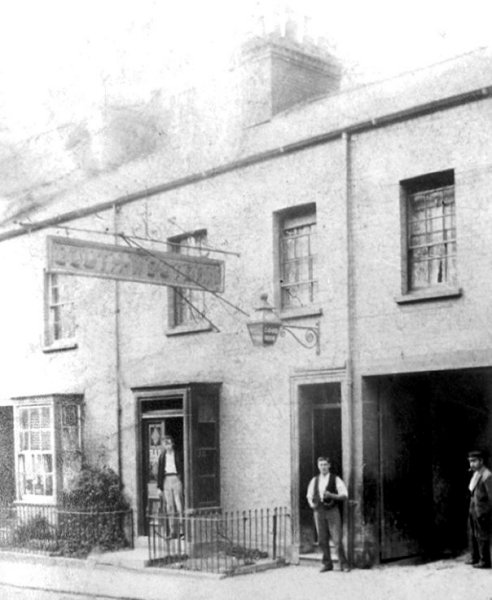
This photograph, taken about 1900, is of the South Western Arms in Middle Street. Is one of these men James Tucker Mitchell who was licensee at the time?
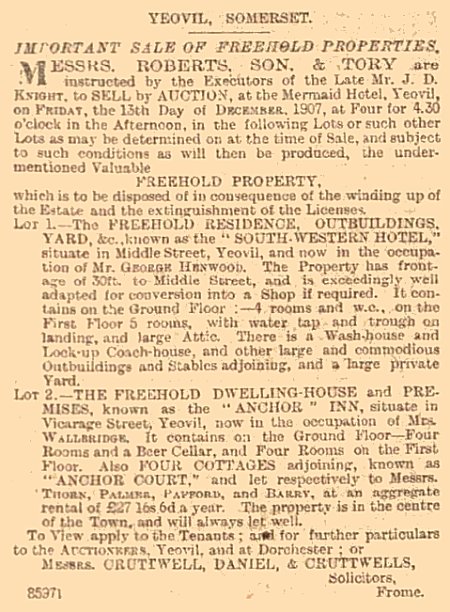
The notice of sale of the South Western Hotel, Middle Street, and the Anchor Inn, Vicarage Street, together with Anchor Court that lay behind it. These were the properties belonging to Mr JD Knight and were sold after his death. The notice was placed in the 6 December 1907 edition of the Western Gazette.
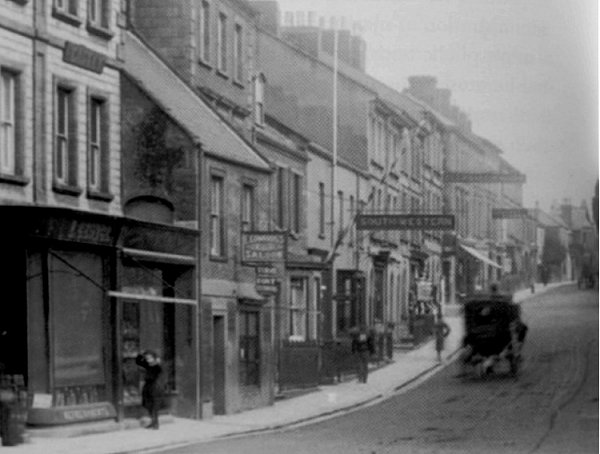
This photograph dates to 1903 and shows the north side of lower Middle Street with the South Western Arms clearly marked by its large projecting sign.
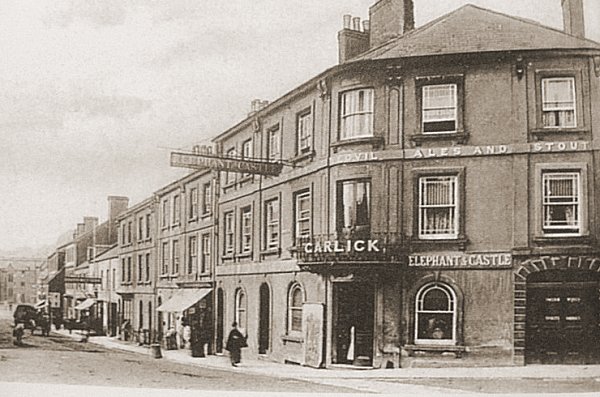
Photographed in 1905, the South Western is visible as the white two-storey building in the lower left corner with its sign projecting into the street.
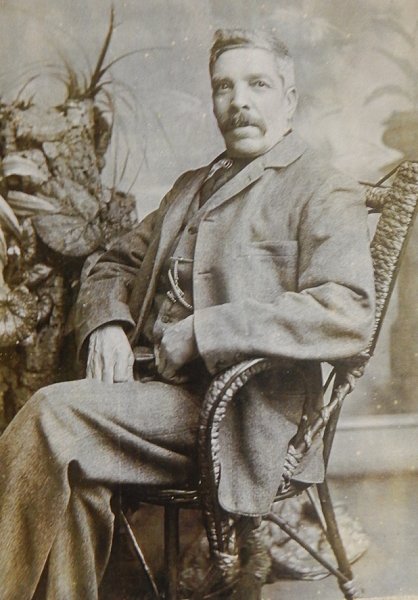
From my
collection
George Henwood, licensee of the South Western Arms in 1907.
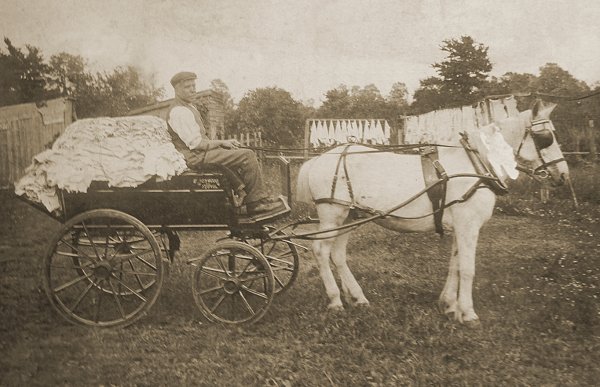
From my
collection
George Henwood's other occupation (most likely his 'day job') was as a leather staker (one who flexes and stretches leather to make it flexible) - a trade he returned to after the pub closed and became a fishmonger's. Here George poses with his horse and cart.
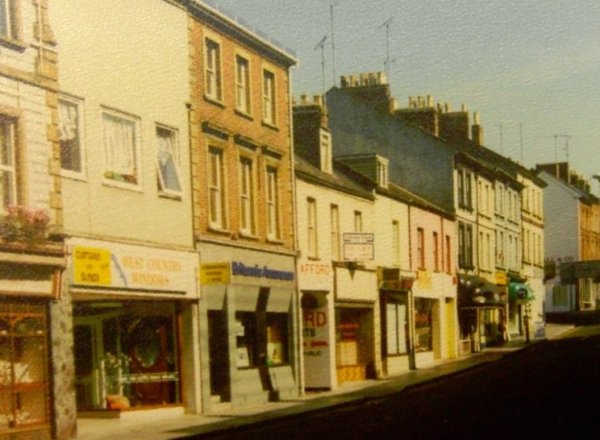
Almost the same view as the 1903 photograph above but taken in the 1970's shows the two-storey South Western Arms building now used as a shop (with the pink upper storey) almost dwarfed by its neighbouring three-storey building towering over it.
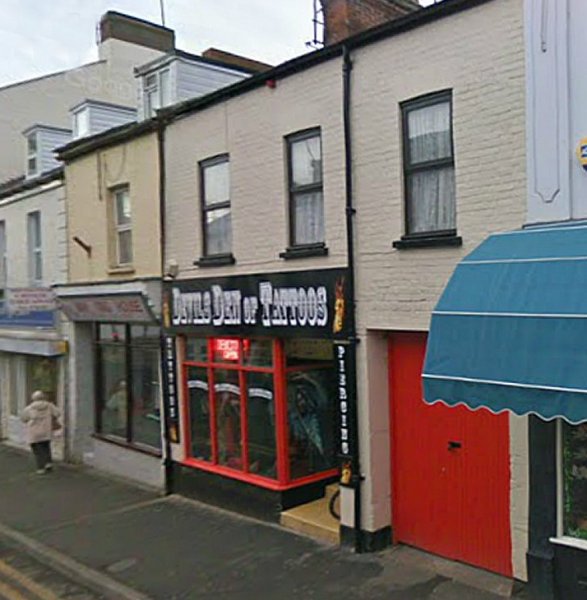
The same building, photographed in 2012.
licensees
1861 – Levi
Ridout – Beer
Retailer and
Carpenter
(Kelly's 1861
Directory) in
Sherborne Road
1861 – Levi
Ridout – Builder
(1861 census)
listed in Middle
Street
1861 – George
James Ridout –
new license
refused (Petty
Sessions) South
Western Inn
1867 –
William Skinner
– application
for ale-house
license -
refused (Petty
Sessions)
1868 – William
Skinner –
several fowls
stolen (Western
Gazette) South
Western Inn
1870 – William
Skinner –
refused spirit
license (Petty
Sessions)
1871 – Ellen
Pretty (37 year
old widow) – Inn
Keeper Beer
House (1871
census) listed
as
the South
Western Arms
1875 – Helen
Pretty – Beer
Retailer
(Kelly's 1875
Directory)
1881 – Elias
Browning – Inn
Keeper (1881
census) listed
as the South
Western
1882 – James
Green (Whitby's
1882 Yeovil
Almanack
Advertiser)
listed as South
Western Inn
1884 – John
Wilkins –
license transfer
(Borough Petty Sessions,
January)
1884 – George H
Childs – license
transferred
(Borough Petty Sessions,
January)
1884 – George
Childs –
summoned for
having his house
overcrowded
(Petty Sessions)
1891 – George
Childs –
Publican (1891
census) listed
as the South
Western
1895 – George
Childs – Beer
Retailer
(Kelly’s 1895
Directory) pub
not named
1897 – John
Morris – Beer
Retailer
(Kelly's 1897
Directory)
listed as the
South Western
1899 – John
Morris (Whitby's
1899 Yeovil
Almanack
Advertiser)
listed as South
Western Hotel
1900 – James T
Mitchell
(Whitby's 1900
Yeovil Almanack
Advertiser)
1901 – James
Mitchell –
Harnessmaker &
Innkeeper (1901
census)
1903 – George
Griffin
(Whitby's 1903
Yeovil Almanack
Advertiser)
1906 – George
Henwood –
License refused
(Somerset County
Licensing
Committee)
1907 – G Henwood
(1907 Yeovil
Directory)
listed as South
Western Inn, 54
Middle Street
1907 –
Compensation
paid
(Somerset County
Licensing
Committee)
1911 – premises
listed as a
Fishmonger’s
(1911 census)
pub not named
but at 54 Middle
Street